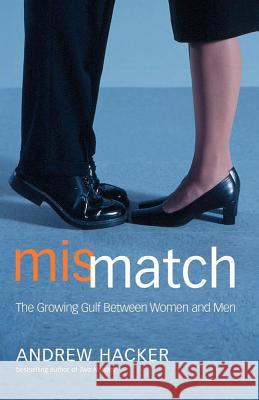Mismatch: The Growing Gulf Between Women and Men » książka
Mismatch: The Growing Gulf Between Women and Men
ISBN-13: 9780684862538 / Angielski / Miękka / 2007 / 240 str.
After tackling the sensitive issues of race and wealth, bestselling author Andrew Hacker now turns his authoritative analysis to a topic on which almost everyone has an opinion: the relationship between the sexes. Skillfully employing a wide range of new and startling statistics, he finds a gender divide that is only getting wider, with devastating consequences for family life and personal happiness.
Whether measured by quantity or quality, marriages are weaker and briefer than at any time since this nation began. Gone are the days when men and women happily assumed the complementary roles of provider and caretaker. Today's women are unwilling to truncate their goals to make life congenial for men; instead they are competing for -- and often winning -- places once thought of as solely male preserves. At the same time, fewer men can satisfy the expectations modern women have for their dates and mates. What does this mean for the future of intimate relationships?
Andrew Hacker probes statistics on divorce and parenthood to explain why more women are initiating divorce and why so many are raising children alone -- or choosing to forgo motherhood altogether. He notes that more men are skipping college, just as more women are entering and succeeding at careers once dominated by men. But even as women make great strides in the workplace, double standards and glass ceilings persist, suggesting continuing and new forms of hostility and discrimination. Hacker also confronts the troubling question of why, in a civilized nation, rape and assault against women remain widespread and why men and women are opposed on fundamental issues such as gun control and abortion. Perhaps most provocatively, he makes the prediction that the social patterns of white Americans are beginning to mirror those of blacks -- yet another result of the growing gender divide.
Sure to incite discussion and debate, Mismatch is an important, defining book from the "political scientist known for doing with statistics what Fred Astaire did with hats, canes, and chairs" (Newsweek).











